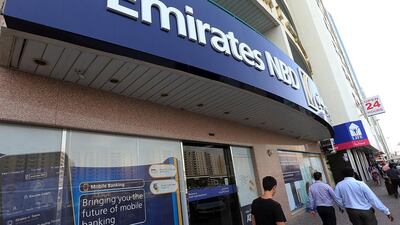Dubai’s biggest bank said it expects the rate of economic growth in the country to improve to 3.4 per cent this year, in stark contrast to the IMF’s latest forecasts of a slowdown.
Emirates NBD said in a surprisingly bullish outlook, part of its release of first-quarter earnings yesterday, that the economy would pick up “this year as higher oil prices contribute to improved consumer and business sentiment in 2017 and facilitate slightly higher government spending”.
It also said that growth is projected to accelerate to 4.1 per cent in 2018 off the back of stronger non-oil activity in Dubai amid increased investment in infrastructure. The bank’s outlook for next year is closer to the IMF’s own forecast for real GDP growth for 2018 in the UAE, at 4.4 per cent, but it is way off the IMF’s view for 2017. For this year the IMF has cut its estimate to just 1.5 per cent from a 2.5 per cent forecast in October. The IMF estimates that the UAE economy grew at a rate of 2.7 per cent last year.
The slowdown this year will come as an Opec and non-Opec deal to cut crude output wipes out any gains from higher oil prices in terms of government revenue across the oil-producing countries of the region.
“Iraq, Kuwait, Saudi Arabia, and the United Arab Emirates are bearing the brunt of the cuts,” the IMF said on Tuesday, referring to the deal reached in November to cut Opec production by 1.2 million barrels per day (bpd) to 32.5 million bpd.
The deal is credited with lifting oil prices by about 20 per cent over the past few months, but lower production is impacting its biggest contributors such as the UAE.
The IMF’s view is in line with other private institutional forecasts, such as that of Abu Dhabi Commercial Bank (ADCB), which is projecting real GDP growth for the UAE to slow to 1.2 per cent this year, down from 2.5 per cent last year.
However, Emirates NBD said yesterday that the introduction of a value added tax (VAT) in the GCC next year could result in an uptick in consumer spending in the second half of this year.
“Anticipation of a 5 per cent VAT to be introduced in early 2018 may boost spending in the second half of 2017, as consumers bring forward purchases that otherwise would be made in 2018,” it said.
Yesterday Emirates NBD reported an uptick in first-quarter profit as its efforts last year to reduce costs began to take effect.
Net profit for the first three months increased 3.6 per cent year-on-year to Dh1.87 billion from Dh1.8bn a year earlier.
The reported net profit figure is ahead of analyst expectations, with an average forecast of a 1 per cent decline to Dh1.79bn.
Costs improved 11 per cent year-on-year, the lender said in its results presentation document released to the DFM. Last year, about 300 jobs were shed by the group. Impairment allowances also fell in the first quarter, to Dh639 million, from Dh829m, a year earlier.
Total income was lower in the first three months of 2017 compared to the same period a year earlier at Dh3.6bn from Dh3.9bn as net interest income dipped to Dh2.48bn from Dh2.55bn on a contraction in net interest margins. This is a measure of the difference between interest income generated by the bank and the amount of interest paid out, for example on deposits. In the first quarter deposits were up 10 per cent year-on-year.
However, quarter-on-quarter, net interest margin improved as rate rises began to show.
Shayne Nelson, the bank’s chief executive, said that the group’s liquidity position remained strong and that it is focused on improving margins by enhancing its funding base.
As earnings season kicked off, results from lenders including Dubai Islamic Bank and United Arab Bank have indicated improving economic conditions amid the firming of oil prices and an uptick in infrastructure spending.
The profitability of UAE banks has been dented in recent years because of low oil prices, but this week, the consultancy Alvarez & Marsal said that there were signs of this downward cycle bottoming out.
Seven of the 10 banks reviewed by the consultancy improved their cost-income ratios at the end of last year compared with the fourth quarter of 2015 amid prudent measures such as delaying investments and hiring.
malarawi@thenational.ae
Follow The National's Business section on Twitter


